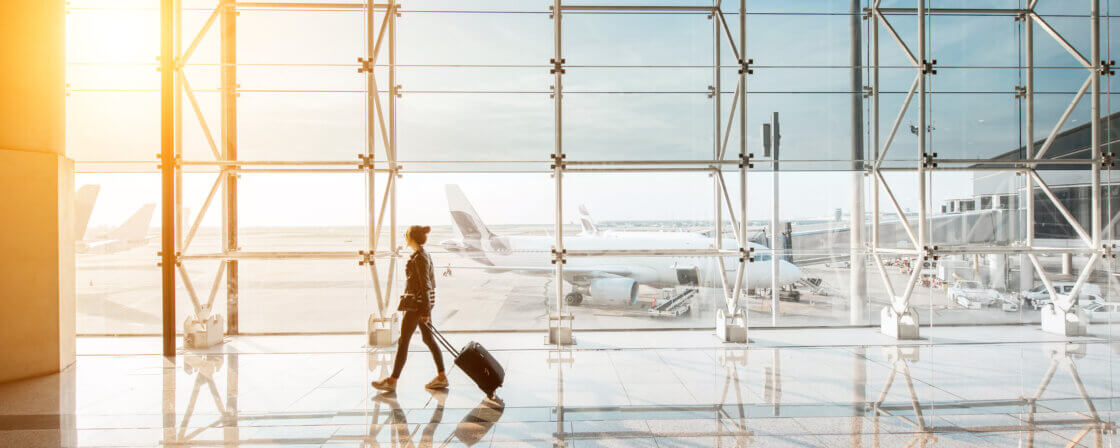Complaints about individual types of transport
Complaints about transport services, whether by plane, train or coach, are governed by the general rules on complaints, but individual carriers also have the option of adjusting the details in their terms and conditions, which must then comply with applicable legislation. Not only do national rules come into play, but also EU regulations specifically for EU citizens.
It is always important to read the carrier’s terms and conditions carefully before you travel (or at the latest when you have an incident) and to familiarise yourself with the conditions under which a claim can be made, the time limits for making a claim and your rights as a passenger.
Are you solving a similar problem?
Dealing with a delayed flight or train? We can help you get compensation
A delayed or cancelled flight, train or bus doesn’t have to mean lost time. You’re entitled to compensation or damages – and we’ll help you get them. We’ll find out if you’re entitled to financial compensation, prepare the necessary documents and deal directly with the carrier or insurance company.
I need help
- When you order, you know what you will get and how much it will cost.
- We handle everything online or in person at one of our 6 offices.
- We handle 8 out of 10 requests within 2 working days.
- We have specialists for every field of law.
Tip for article
Tip: Are you planning to travel by train, bus or plane? And did you know that you always sign a transport contract? What are the important aspects of a transport contract, what exactly does it contain and what rights and obligations does it imply for you? We will look at this in a separate article.
General complaints policy:
- Passenger rights: passengers have the right to complain if services are not provided in accordance with the contract or the expected quality. This includes delays, cancellations, loss of luggage or other complications.
- Time limits for filing a claim: The law usually states that a claim should be filed as soon as possible after the problem is discovered, but the specific time limits may vary depending on the type of transport and the conditions of the carrier.
- Handling the claim: The law requires the carrier to handle the claim within 30 days of receipt. If the carrier fails to settle the claim within this time limit, the claim is deemed to be justified.
Rail transport
The rights of rail passengers in the European Union are now primarily regulated by Regulation (EU) 2021/782. This includes rights to compensation in the event of train delays or cancellations, as well as the obligations of carriers to inform and assist passengers.
If your train is delayed, you are entitled to compensation of 25% of the ticket price for delays of 60-119 minutes and 50% for delays of 120 minutes or more. The minimum amount of compensation is €4.
If you did not buy an individual ticket but have, for example, a monthly ticket, then there is a one-off compensation, for example, ČD will compensate network ticket holders with €50 for delays of 60 to 119 minutes, and €100 for delays of more than 120 minutes.
If you find out before boarding the train that the train is delayed, you have the right to return the ticket and the carrier will refund the fare paid. Another option is to change your ticket so that you can get to your destination as quickly as possible by other means. Again, the carrier should be able to accommodate you.
You will also be entitled to compensation if you decide not to continue your journey (in the event of a delay). Therefore, if you decide not to use ČD or another carrier in such a case, you are entitled to a refund of the fare and compensation for the delay. In this case, you should apply for a refund, for example, at the nearest ticket counter. If you bought your ticket online, the refund should be more than CZK 100.
Bus transport
Bus passengers’ rights are also regulated by Regulation (EU) No 181/2011 of the European Parliament and of the Council, which applies to long-distance bus services. Carriers are obliged to refund fares or provide an alternative service in the event of cancellation or long delays.
For bus services, many of the rules are similar but not identical. The Regulation states that for long-distance bus routes (minimum 250 km), if cancellations or delays of more than 120 minutes occur, a refund of the fare or continuation of the journey can be requested. If the carrier does not offer these options, additional compensation of 50% of the ticket price is due. The passenger shall have the choice between continuing the journey, being redirected to the final destination or receiving a refund. The condition of having a reserved seat ticket is not required – the decisive criteria are that it is a long-distance service (≥ 250 km) and that there is a delay or cancellation of more than 120 minutes
Air transport
Passenger rights are regulated in detail by Regulation (EC) No 261/2004 of the European Parliament and of the Council, which sets out the conditions for compensation and assistance to passengers in the event of delay, cancellation or denied boarding. Here, passengers’ rights are relatively strictly defined and carriers have less scope to adjust conditions.
The scope of the Regulation includes:
- departure from an airport located in the territory of a Member State of the European Union, Norway, Iceland and Switzerland,
- a departure from an airport located in the territory of a third country, i.e. a non-EU country, to an airport located in the territory of an EU Member State, where the operating air carrier is also competent in a Member State of the European Union.
In the case of flight delays, the key factor is the length and reason for the delay. Compensation is payable if the flight is delayed for more than three hours. The length of the delay is calculated according to the arrival at the final destination. However, if the delay was caused, for example, by weather conditions or other similar events beyond the fault of the airline, there is no entitlement to compensation. The passenger will therefore be entitled if there is, for example, a defect in the aircraft, a sick crew member, etc.
The amount of compensation depends on the distance:
- eUR 250 – flights up to 1 500 km
- eUR 400 – flights from 1 500 km to 3 500 km
- eUR 600 – flights over 3 500 km
The length of the delay is the difference in arrival time at the final destination compared to the originally scheduled arrival time. In order to receive compensation, the flight at the final destination must be delayed by at least three hours.
Tip for article
Tip: What to do if other things go wrong during the trip? The hotel doesn’t have your room size and instead of a sea view you are looking into a yard with garbage? This is what we focus on in our next article dedicated to holiday claims.
Passengers are also entitled to free refreshments or free accommodation if they have to wait until the next day for their flight.
You can claim free meals and refreshments to the extent reasonable for the waiting time in the event of a delay:
- 2 hours or more for flights up to 1 500 km,
- 3 hours or more for intra-EU flights longer than 1 500 km,
- 3 hours or more for other flights between 1 500 km and 3 500 km,
- 4 hours or more for all other flights.
Similar entitlements arise in the event of cancellation. If passengers were informed of the cancellation less than 14 days in advance (and it is not a force majeure cancellation), the same amounts can be claimed from €250 – €600.
In addition to refunds, re-routing to the final destination under comparable conditions is also available.
If these conditions are not met, the Regulation cannot be applied. In this case, you can then only claim compensation for any damages arising from the delayed or cancelled flight on the basis of the so-called Montreal Convention.
Summary
Frequently Asked Questions
Am I entitled to compensation for flight delays?
Yes, you are entitled to flight delay compensation if your flight is delayed by more than three hours and the delay is caused by the carrier (e.g. technical fault of the aircraft, missing crew, etc.). The amount of compensation for a delayed flight varies between EUR 250 and EUR 600 depending on the length of the route. If there were exceptional circumstances, such as bad weather or flight restrictions, the airline is not liable and no compensation is payable.
What should I do if I want to get compensation for a delayed flight?
First check that the flight has been delayed for at least three hours and that the cause is not beyond the carrier’s control. You can then file a claim for compensation directly with the airline or through a lawyer.
What are my options with ČD if my train is delayed?
For rail transport, a European regulation entitles you to a partial refund if your train is delayed for more than 60 minutes.
-
For delays of 60-119 minutes, ČD will compensate you for 25% of the ticket price.
-
For delays of 120 minutes or more, ČD will compensate you for 50% of the fare.
If you decide not to travel at all, you are entitled to a full refund of the ticket price.
You can make a claim or request compensation from ČD online or at the ticket office.
Am I entitled to compensation even if my flight is cancelled?
Yes. If your flight was cancelled less than 14 days before departure, you are entitled to compensation for the cancelled flight under the same regulation (EU 261/2004). The compensation is again €250-600 depending on the distance of the route.
In addition to monetary compensation, you are also entitled to re-routing or refund and possibly refreshments or accommodation if you have to wait until the next day.
What should I do if the carrier refuses compensation or does not contact me?
If the carrier fails to respond within the time limit or refuses compensation, please contact us. We will assess whether the carrier’s liability is actually excluded and prepare a legal procedure to enforce your rights.





